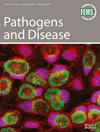题目:基于疟原虫作用时间和靶细胞器分类快效和慢效抗疟药的综述。
IF 2.7
4区 医学
Q3 IMMUNOLOGY
引用次数: 1
摘要
对疟疾寄生虫的临床耐药性使许多抗疟药物无效,这可能是由于缺乏对所有生命阶段的作用时间和阶段特异性的了解。因此,为了解决这一问题,我们对抗疟药物与寄生虫时间杀伤动力学和靶细胞器在血期寄生虫进展中的关系进行了更深入全面的快速和慢效分析。大量研究结果表明,靶向食物液泡、核组分和内质网的药物主要在24小时内表现为快速杀伤表型,影响第一周期活性。而靶向线粒体、顶质体、微管、寄生虫入侵和出口的药物在96-120h内表现出很大程度上的慢杀表型,影响第二周期活性,很少有中等快杀的例外。了解药物对48h红细胞内寄生周期各阶段环、滋养体、分裂体、分裂子的敏感性和细胞器外观的影响是至关重要的。因此,这些参数可能有助于理解抗疟药物作用时间的范式,从而破译其与时间相关的精确机制。因此,基于杀伤时间对药物进行分类可能有助于设计新的联合方案,以对抗不同类型的恶性疟原虫,并评估潜在的临床耐药性。本文章由计算机程序翻译,如有差异,请以英文原文为准。
Title: A Comprehensive Review on Classifying Fast-acting and Slow-acting Antimalarial Agents Based on Time of Action and Target Organelle of Plasmodium sp.
The clinical resistance towards malarial parasites has rendered many antimalarials ineffective, likely due to a lack of understanding of time of action and stage specificity of all life stages. Therefore, to tackle this problem a more incisive comprehensive analysis of the fast and slow-acting profile of antimalarial agents relating to parasite time-kill kinetics and the target organelle on the progression of blood-stage parasites was carried out. It is evident from numerous findings that drugs targeting food vacuole, nuclear components, and endoplasmic reticulum mainly exhibit a fast-killing phenotype within 24h affecting first-cycle activity. Whereas drugs targeting mitochondria, apicoplast, microtubules, parasite invasion and egress exhibit a largely slow-killing phenotype within 96-120h, affecting second-cycle activity with few exemptions as moderately fast-killing. It is essential to understand the susceptibility of drugs on rings, trophozoites, schizonts, merozoites, and the appearance of organelle at each stage of 48h intraerythrocytic parasite cycle. Therefore, these parameters may facilitate the paradigm for understanding the timing of antimalarials action in deciphering its precise mechanism linked with time. Thus, classifying drugs based on the time of killing may promote designing new combination regimens against varied strains of P. falciparum and evaluating potential clinical resistance.
求助全文
通过发布文献求助,成功后即可免费获取论文全文。
去求助
来源期刊

Pathogens and disease
IMMUNOLOGY-INFECTIOUS DISEASES
CiteScore
7.40
自引率
3.00%
发文量
44
期刊介绍:
Pathogens and Disease publishes outstanding primary research on hypothesis- and discovery-driven studies on pathogens, host-pathogen interactions, host response to infection and their molecular and cellular correlates. It covers all pathogens – eukaryotes, prokaryotes, and viruses – and includes zoonotic pathogens and experimental translational applications.
 求助内容:
求助内容: 应助结果提醒方式:
应助结果提醒方式:


